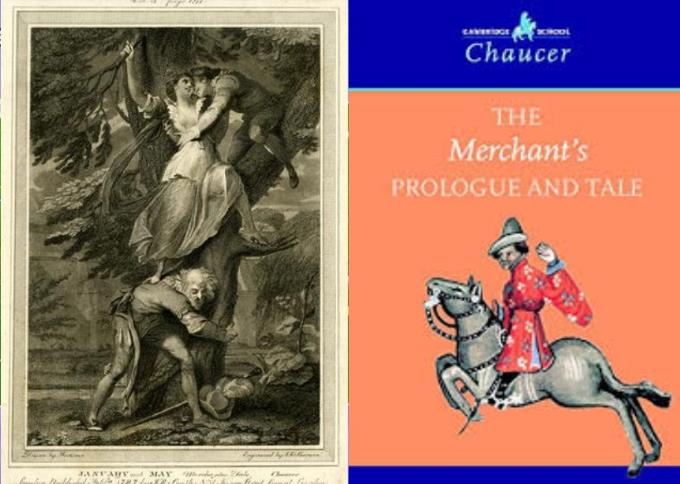In Geoffrey Chaucer's renowned work, "The Merchant's Tale," the theme of self-deception assumes a central role. Through the character of January, a Knight from the town of Pavia in Lombardy, Chaucer explores the profound effects of self-delusion on one's relentless pursuit of marital happiness. January had led a life of wantonness for nearly sixty years and was suddenly overcome by a strong desire to marry. He believed that marriage was an earthly paradise and wished to marry a beautiful young maiden who could bear him a son and heir. As he embarks on his quest to find a suitable wife, the allegorical tale cunningly explores the intricacies of human desires and the fragile illusions individuals often construct within the institution of marriage.
In Geoffrey Chaucer's "The Merchant's Tale," January's quest for fulfillment through marriage exposes the tension between individual desire and societal expectations. January seeks advice from his friends, Placebo and Justinus, both of whom offer contrasting viewpoints on the matter.
Placebo encourages January to follow his own instincts and desires, arguing that personal happiness should be the ultimate goal in choosing a partner. He suggests that January should prioritize his own needs and not be constrained by societal norms or expectations. Placebo's perspective aligns with the idea of individual agency and self-fulfillment, where personal happiness takes precedence over conforming to social conventions.
On the other hand, Justinus assumes a more cautious stance, warning January about the unpredictability of women. He emphasizes the risks and potential consequences associated with marrying a younger woman. Justinus highlights the potential for infidelity, manipulation, and dissatisfaction that may arise from such an unequal partnership. His viewpoint reflects the concerns associated with societal expectations and the potential pitfalls of pursuing personal desires without considering the broader consequences.
Despite the warnings and differing opinions, January remains steadfast in his pursuit of a youthful bride. He is unwavering in his determination, driven by the hope of finding fulfillment through marriage. January's singular focus suggests the power of personal desire and the potential disregard for societal expectations in the pursuit of happiness.
Chaucer presents the contrasting perspectives of Placebo and Justinus to illustrate the complexities and internal conflicts faced by individuals when making important life choices. The discourse surrounding January's decision ultimately highlights the tension between personal desires and societal expectations, inviting readers to reflect on the complexities of human nature and the pursuit of happiness.
The sudden loss of eyesight shatters January's marital bliss. Growing more possessive, January restricts his young wife's movements, forbidding her from venturing out alone. Meanwhile, May seizes an opportunity to engage in secret trysts with her lover, Damian, within the confines of January's garden. Unaware of the illicit couple, the gods Pluto and Prosperina observe their actions and engage in a contemplative debate.
In a twist of fate, Pluto restores January’s sight precisely when he witnesses May and Damian in an intimate embrace. Yet, instead of confronting the truth, January chooses to embrace a narrative spun by May, who claims her actions were aimed at curing her husband’s sight. Willingly blinding himself to the truth, January forgives May, embracing her, and perpetuating the illusion of a harmonious marriage.
Within 'The Merchant's Tale,' Chaucer presents the character of the Merchant, a disillusioned observer who voices his contempt for marriage. Through the Merchant, Chaucer delves into the bitter realities of life, and the character criticizes January's decision to marry after leading a carefree bachelor's life. The tale invites serious discussion on marriage, shedding light on its flaws and complexities. The Merchant suggests that genuine happiness can only be attained through willful blindness, as January willingly deceives himself and remains blind to his wife's betrayal.
Geoffrey Chaucer’s ‘The Merchant’s Tale’ masterfully explores the theme of self-deception and the intricate dynamics of marital relationships. As the narrative unfolds, it illuminates the ironic nature of marriage, where love and treachery often coexist. By restoring January’s sight, Chaucer metaphorically portrays his willful ignorance, allowing him to live in blissful ignorance of his wife’s infidelity. This allegory provokes readers to question the nature of self-deception and the precarious illusions individuals construct in their pursuit of happiness within the confines of marriage.
‘The Merchant’s Tale’ serves as a cautionary tale, addressing the complexities and pitfalls of love, trust, and the frailties of human nature. Chaucer’s exploration of self-deception requires readers to critically examine the choices and illusions woven throughout the tale, shedding light on the paradoxical nature of love and marriage. Through this literary masterpiece, Chaucer prompts us to question the realities of our own lives, reminding us of the delicate balance between truth and the seductive allure of self-imposed blindness.




